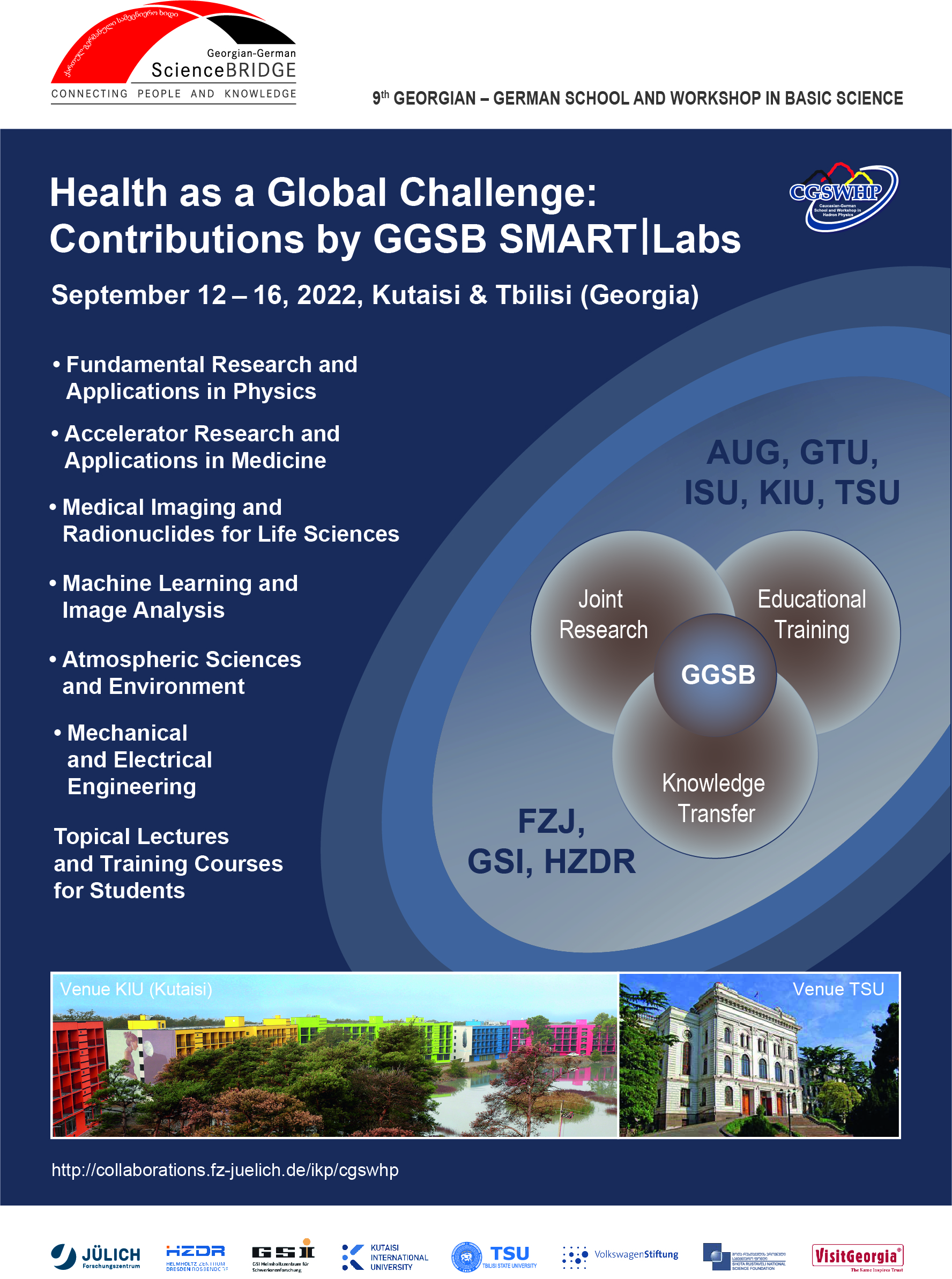About the Workshop (originally planned in 2020)

Forschungszentrum Jülich (FZJ), together with the Georgian partner universities (AUG, ISU, GTU, KIU and TSU), in close coordination with the Helmholtz Zentrum Dresden-Rossendorf e.V. (HZDR) and the GSI Helmholtzzentrum für Schwerionenforschung in Darmstadt, are planning the 9th Georgian-German School and Workshop in Basic Science (GGSWBS), in the framework of the Georgian-German Science Bridge (GGSB). The workshop will focus on the topic: "Heath as a Global Challenge: contributions by GGSB and its SMART|Labs". The original plan was to hold event in 2020 (September, 7- 12) but due to the well-known constraints on travel issues and related aspects of safely regulations (both in Georgia and Germany), was decided to postpone first to 2021, and now, the meeting will be held in Kutaisi (KIU) and Tbilisi (TSU), Georgia, during September 12 - 16, 2022.
For more than 20 years, the Helmholtz Research Centre in Jülich (FZJ) successfully cooperates with a consortium of Georgian Universities (TSU, GTU, ISU, and AUG). It started at the beginning of nineties with a collaboration between the Nuclear Physics Institute (IKP) of FZJ and a small group of TSU scientists (HEPI TSU), based on a joint research program at the COSY accelerator in Jülich. This international collaboration has been extended later by other FZJ institutes: Energy and Climate Research (IEK), Neuroscience and Medicine (INM), Bio- and Geo Sciences Research (IBG), and Electronics and Mechanical Engineering (ZEA). Recently from the Georgian side this cooperation was joined by the Kutaisi International University (KIU).
The Georgian-German Science Bridge (GGSB) comprises 3 pillars: (i) Education: Educational programs for Georgian students are pursued in form of various internship programs at FZJ and block-lectures in Georgia; (ii) Research: Georgian students together with their supervisors are actively involved in the diverse common research for their Master and PhD projects; (iii) Knowledge transfer: Reintegrating young, well trained Georgian scientists into the Georgian university structures by the foundation of so called SMART|Labs (SMART stands for Science, Medicine, Applied Research and Technology). Jülich and Georgia attach great importance to this possibility: with the support of the Georgian government (Ministry of Education and Science via the Shota Rustaveli National Science Foundation) two SMART|Lab's were established in the fields of Nuclear Physics (SMART|EDM_Lab) and Atmospheric Chemistry & Simulations (SMART|AtmoSim_Lab); Jülich has provided part of the scientific equipment.
The SMART|EDM_Lab is in operation at Tbilisi State University (TSU) since January 2017. Its research contributes to the JEDI project, the Juelich Electric Dipole moment Investigations, which aims to search for permanent Electric Dipole Moments (EDMs) of charged hadrons. The SMART|Lab thus offers young Georgian scientists an attractive opportunity to join forefront scientific projects from a base in Georgia. Since September 2017, the SMART|AtmoSim_Lab operates at TSU, based on a collaboration between the Jülich Institute of Energy and Climate Research (IEK-8, Troposphere) and the TSU faculty of Exact and Natural Sciences. The lab is dedicated to atmospheric research, which includes chemical analysis of atmospheric pollutants, mathematical analysis of data and modeling of air pollution. Further SMART|Labs are planned in the areas of brain research and medical applications in collaboration between the Institute of Neuroscience and Medicine (INM) of FZJ and KIU.
This time, September 2022, in the frame of the extended cooperation (GGSB PLUS), we plan to have a topical meeting on “Health as a Global Challenge“. It will focus on health (in particular diagnostics and treatment of deseases (cancer)) and environment (e.g. pollution as a cause of health issues). In addition, it will cover scientific and technological aspects of the planned hadron therapy center at KIU.
The aim of the workshop is to bring together worldwide experts from the accelerator groups, medical physicists and physicians, life science and technology from various international partners to summarize achievements in the field and to initiate discussions on further scientific and technological cooperation between the two countries. In addition, we also plan to have dedicated lecturing courses for Bachelor, Magister and PhD students in a wide range of Natural and Engineering Sciences, as well as brainstorming on scientific (ongoing and future) projects and educational (student exchange) programs.









